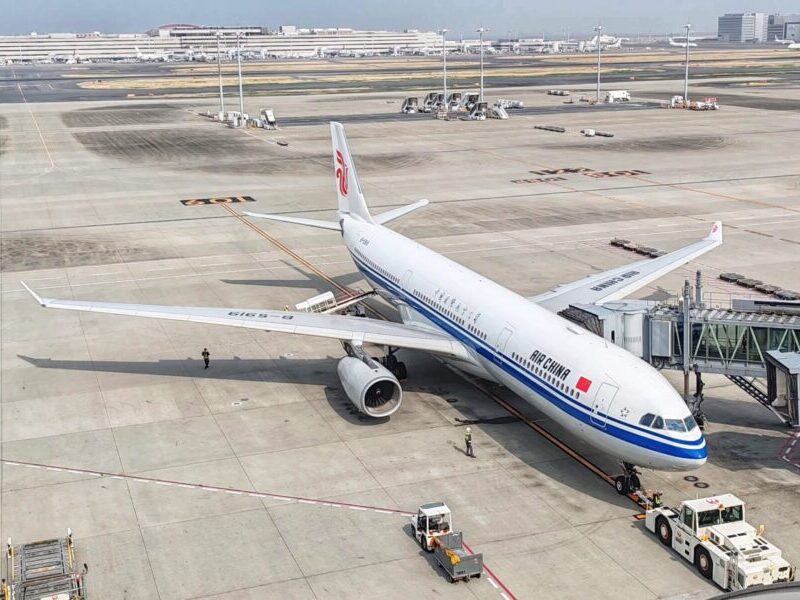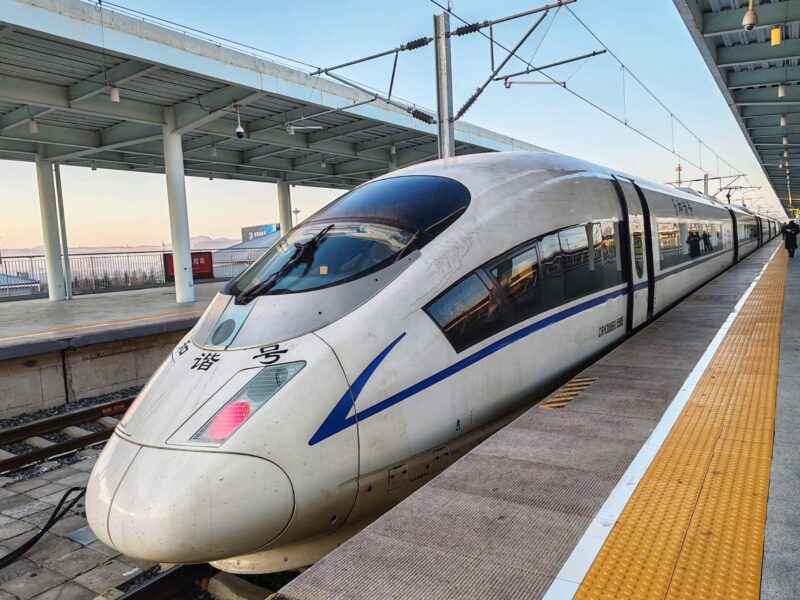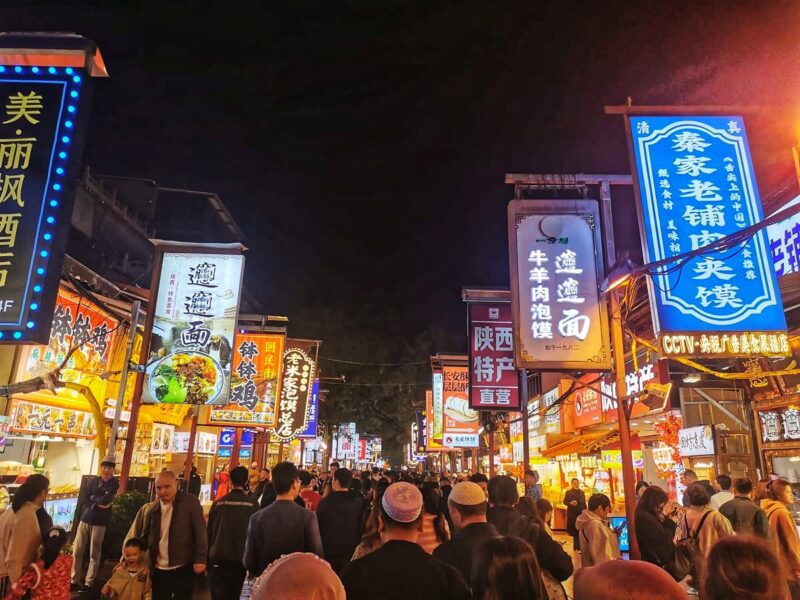Last updated on December 31st, 2025
Are you planning a trip to China? Read this China Travel Guide for all the essential information needed to organize your travel. Here, we share valuable tips and important details to help you plan your trip.
Travel to China! You won’t believe how amazing this country is until you visit it. From the majestic Forbidden City and the Terracotta Army, bustling cities like Shanghai and Guangzhou, and the natural wonders in Sichuan and Zhangjiajie, the list of must-see attractions is endless!
Planning a DIY trip to China is unlike any other journey I’ve organized. It requires significantly more research due to the country’s regulations and language barrier. There are not many travel resources about China on the internet, and it can be challenging to find comprehensive trip planning content. While Chinese social media has a lot of shared experiences, they often lack detail.
To spare you the difficulties I faced, I’ve created a guide that covers all the essential information you need to know when planning your own trip to China. This includes everything to consider before going, along with some insider tips to help you navigate your trip to this incredible country.
CHINA In A Glance

Planning a trip to China? These helpful tips will ensure you make the most of your time in this fascinating country!
- Country: China (中国), officially the People’s Republic of China (中华人民共和国)
- Language: The primary language spoken is Mandarin.
- Currency: The currency used is Renminbi (RMB)/Chinese Yuan (CNY) -Symbol: ¥.
- Peak Travel Period: May – Aug
- Visa Requirements: A visa is required for most countries. Depending on your nationality, you will need to check your country’s regulations regarding visas.
English is not widely spoken, so if you cannot read or speak Chinese, you’ll likely rely heavily on a translation app. You can also use the mini-app feature within Alipay for assistance
For More China Travel Information: Your China Travel Guide – Start Here!
When is the Best Time To Visit China

China is a year-round travel destination with its vast landscape. The country features four distinct seasons and varying temperatures throughout the year. You can visit the country at any time, but it’s important to consider your weather preferences.
The best time to visit is from September to November during the autumn season when the temperatures are pleasantly cool. Be sure to bring appropriate clothing for the season you choose to visit.
Spring and fall are typically the ideal times to travel to China. In spring, flowers are in bloom, while fall offers breathtaking colorful foliage.
Summer can be hot and humid across much of China, but traveling to mountainous areas during this time is more manageable.
Winters can be quite frigid, particularly in northern China, where January is the coldest month with average daily temperatures below zero. In southern China, however, winters tend to be milder. Most of the rain occurs from June to August, which can disrupt travel plans.
China Travel Tips: China is a MASSIVE country (1.4 million people!). Avoid traveling during major national holidays unless you love the crowds and long lines. Chinese New Year and the October Golden Week are SUPER PEAK seasons for domestic travelers.
Cheap Flight Ticket to China

There are regular flights from many cities around the world to China, and these flights are frequent and reasonably priced.
To find the cheapest flight, visit Trip.com and experiment with different combinations of dates and destinations. When you find a good deal, it’s a good idea to check the airline’s website directly. Generally, most Chinese airlines are acceptable. Additionally, remember that booking round-trip flights from the same city is usually cheaper.
Browse Trip.com for your China Trip
However, due to the size of China, this may not always be feasible. If there is a significant price difference, you can still book a round trip from the same city and check for high-speed trains that connect your final destination to the city from where you will catch your return flight to your home country. The country is well-connected within cities by rail and bus. You can check Trip.com for High-speed Train schedules and bookings.
Booking Hotel in China

When traveling to China, you will find a wide range of good hotels, especially in major cities like Beijing, Shanghai, and Guangzhou. Hotels in China are generally affordable, allowing you to save some money. We recommend looking for at least 4-star to 5-star hotels to meet your minimum requirements. Customer service is typically very good and welcoming.
One major concern when staying at hotels in China is the cigarette smell. It is quite common to encounter a smelly room, even if you book a non-smoking room. To avoid this, it’s wise to check customer reviews. It is advised to choose hotels with positive reviews to lead you to a better travel experience.

Some hotels, particularly in rural regions, do not accommodate foreign travelers, even if they are listed as available. Possible due to language barriers and local policies. That’s why we recommend booking your hotel through Trip.com, as all hotels listed there accept foreign travelers. While Booking.com offers great deals, Trip.com is often safer and more reliable. We have booked almost all our hotels in China through Trip.com and have had no issues so far.
Regarding breakfast, most hotels in China serve a traditional Chinese breakfast, which may include items like buns, noodles, or porridge. Don’t expect to find coffee and an international breakfast at budget homestays or cheaper hotels. Be prepared to adapt, especially if you’re traveling to rural areas.
How To Get Around in China – City

If you are traveling between major cities in China, the high-speed train is an excellent option. If possible, try the business class; it provides a truly wonderful experience. We booked our high-speed train tickets through trip.com, and slots became available one week before departure. Keep in mind that tickets can sell out for popular routes, so it’s best to book early.
China Travel Pro Tips: Remember that you will always need a passport to purchase a train or bus ticket.

Getting around in China’s cities is quite convenient using public transport, metro, taxis, ride-hailing services, and even on foot. Generally, I prefer using e-hailing services like Didi (Uber in China), especially when traveling in a group. Subways are available in almost all major cities in China, but be mindful of the crowds, especially during rush hours. Taxis are inexpensive, but the best solution is to use Didi.
We use Didi through AliPay, which is very convenient and available in English. Just be sure to pin your pickup location accurately, and we usually follow up with a photo of the pickup spot for reference. There are three types of car options: economy, standard, and premium. I recommend at least choosing the standard option for short distances and booking premium for long distances. It’s best to skip the economy option if possible.
Bike-sharing is common in China, but you’ll need a Chinese phone number to use the service. For navigation, remember that Google services do not work in China. A good alternative app is Gaode Maps (高德地图) or Baidu Map (百度地图).
How To Get Around in China – Rural Areas

Renting a car to drive in China is not an option, as China does not recognize international driving licenses or any other documentation issued outside its territory. Additionally, obtaining a Chinese driving license is only possible for foreigners who hold a valid resident permit in China.
For visiting non-city attractions, long-distance buses are often the only solution. While public bus connections are extensive, they are mostly not available in English. Traveling by bus is cheaper, but the journey can be extremely slow and tedious, especially for long-distance travel. Long-distance taxi rides can be costly, and most taxi drivers are unwilling to take on long trips. It is important to avoid unlicensed car services under any circumstances.
If you are traveling in a group, many tour companies offer customized trips. You can hire a full-time driver to accompany you on your personalized journey. While this option can be expensive, it allows you to travel at your own pace and according to your preferences. Make sure to choose reputable companies or drivers. It’s also essential to emphasize “NO Shopping”, as some drivers may take tourists to overpriced shops to earn a commission.
For solo travelers, finding companions to share costs is advisable.
Travel Agency vs DIY Trip

If you find planning an itinerary to China to be overwhelming, an experienced travel agency can assist you. While their routes are well-planned and organized, using a travel agency can reduce the hassle of planning yourself. It may be slightly more expensive. The itinerary can sometimes feel packed to ensure you get your money’s worth.
We recommend organizing your trip by hiring a full-time driver through a travel company; this way, you can travel at your own pace.
Traveling in China: Essential Apps

Our trip went smoothly, and one of the main reasons for that was my ability to speak and read Mandarin. There are also several software apps available in Chinese that are commonly used in China, which greatly helped with our trip planning.
Below are the most important apps you will need while traveling in China:
Alipay (支付宝) – This is the primary payment app in China and is accepted almost everywhere. In addition to making payments, Alipay offers services such as ride-hailing and utility bill payments. Most importantly, it works with many foreign debit and credit cards.
WeChat (微信) – This is the real-time messaging app commonly used for chatting in China. However, WeChat goes beyond messaging; it plays a crucial role in daily life in China by facilitating communication, payments, navigation, and social networking. We often used WeChat as a backup payment method when Alipay experienced issues.
DiDi (滴滴出行) – An essential ridesharing app, DiDi is known for its wide availability and affordability. You can also access DiDi services through Alipay and WeChat.
Trip.com – This platform serves as a comprehensive tool for planning trips in China. It allows you to book flights, trains, hotels, and attraction tickets. It’s the best app in English for arranging all aspects of your travels in China.
Browse Trip.com for your China Trip
Gaode Maps (高德地图) – Although this app is only available in Chinese, it functions similarly to Google Maps.
Dazhong Dianping (大众点评) – This app is great for discovering restaurants in China, similar to Yelp in the United States. You’ll find so many food discounts from this app.
With these apps, overcoming the language barrier, navigating your surroundings, and making payments becomes much easier. We will explain these applications in greater detail in our blog post – Travel to China: Essential China Travel Apps.
Were you wondering about eSIM for China? We will share more information below!
How To Connect Internet in China

China’s internet is heavily restricted by what is known as the “Great Firewall,” which blocks many popular Western websites that we are accustomed to using. Almost all foreign websites and apps are censored as part of the government’s control over online content. This includes services like Gmail, Google, Google Maps, YouTube, Facebook, Instagram, and WhatsApp.
When planning to access the internet in China, you have a few options based on your needs:
Enable Roaming: You can enable roaming on your phone, but keep in mind that internet traffic may be slower and unreliable, especially in rural areas.
SIM Card Options: You have two primary options for SIM cards: an eSIM or a physical SIM.
- eSIM: Consider getting an international eSIM to bypass the Great Firewall, which will allow you to access Western websites on your phone. Providers based in Hong Kong are fine for this. However, note that using an eSIM typically does not provide you with a phone number, which is often required to create accounts on Chinese apps. Here is the recommended eSIM to use in China.
- Physical SIM: If you choose a physical SIM card for a Chinese phone number, be aware that you will be blocked from accessing international Western websites. In this case, you would need to use a VPN.
Using a VPN: If you plan to do extensive internet work on your computer while in China, using a VPN is advisable. However, be aware that popular VPNs like ExpressVPN and NordVPN do not work in China. Instead, consider using Astrill or LetsVPN, which are widely used and highly recommended VPN providers for China.
Public WIFI is pretty common in China, especially for most big cities. However, avoid connecting to Wi-Fi networks if you want to access blocked sites. Even hotel Wi-Fi networks will prevent access to sites like Google, Facebook, and Instagram due to the country’s internet restrictions.
How To Perform Payment in China

China is highly digital and has advanced technology compared to many other countries in the world. Locals primarily use WeChat, which is tied to their phone numbers and bank accounts. As a foreign visitor, it’s important to carry your passport with you at all times.
You’ll need your full name and passport number for various activities, as everything is linked to your passport when booking tickets, taking trains, or checking into hotels. Be prepared to present or scan your passport at the entrance of many establishments.
For most day-to-day tourist activities, such as traveling by train, visiting attractions, using the metro, shopping, and paying bills at restaurants, you won’t need physical tickets. Your passport will serve as your ticket.
Please note that using credit cards is often challenging, and cash is not widely accepted either. However, some places still take cash. Be cautious when using larger denomination notes, like the 100 RMB bill, due to concerns about counterfeit money and a lack of change. Even street food vendors generally prefer digital payments.
Is China Safe To Visit?

Crime rates are generally very low in China, thanks to the extensive use of CCTV cameras. Additionally, there are security personnel and police present in public places, such as train stations and even aboard trains, to maintain order. If you follow common safety rules, you should be just fine.
However, be cautious of unlicensed drivers at airports, train stations, bus stations, and tourist attractions. These drivers may approach you with offers of cheaper prices, better deals, or convenience. It’s best to avoid these drivers, as using their services can end up costing you more in the long run.
More China Travel Tips

Here are some interesting observations and culture shocks we experienced during our visit to China:
1. When taking high-speed train rides, it’s essential to arrive at the train stations early since they are quite large. We recommend showing up at least an hour before your departure time, and allow even more time if you are traveling with a group.
2. You’ll have to go through security checks when entering train and metro stations.
3. Getting around using public transportation and on foot is relatively easy.
4. Toilets have significantly improved in urban areas over the past few years, with clean, high-end facilities readily available. However, once you venture into rural areas, the toilet situation can still be quite challenging. A NIGHTMARE to me!
5. Squat toilets are common. Also, I noticed that many locals seem to forget to lock their doors when using the restroom.
6. Most locals don’t queue, which can be quite frustrating. At paid attractions, there are usually assistants to help ensure that people form the line.
7. Spitting in public is still observed, with more prevalence in Beijing compared to Shanghai.
8. Food delivery service in China is impressive. It’s efficient and offers many options, including the use of robots to deliver food directly to your hotel room.
9. People in China are generally very welcoming. Although their voices may be loud, it’s simply their way of expressing hospitality.
10. Lastly, avoid traveling during national holidays in China, such as Chinese New Year and the October Golden Week, as these periods can be particularly busy.
Final Thoughts: What To Know Before Travel to China
This concludes my essential list of things to know before traveling to China. I wish I had known even half of these tips before my first visit. Learned from my mistakes, and I hope this list will better prepare you and make your trip more enjoyable.
Lastly, be sure to check out my other blogs for tips and guides on traveling in China. For more China travel inspiration and information
Zhejiang Province: Shanghai – Suzhou – Hangzhou:
- Shanghai itinerary: A Travel Guide Blog
- Where To Stay in Shanghai: Best Areas and Hotels
- Day Trip Suzhou itinerary: A Travel Guide Blog
- Hangzhou itinerary: A Travel Guide Blog
- Trip to Wuzhen Ancient Water Town: A Travel Guide Blog
Guangdong Province: Guangzhou – Shenzhen:
- Guangzhou itinerary: A Travel Guide Blog
- Where To Stay in Guangzhou: Best Areas and Hotels
- Shenzhen itinerary: A Travel Guide Blog
- Where To Stay in Shenzhen: Best Areas and Hotels
Shaanxi Province: Xi’an, Terracotta Warriors:
- Xi’An itinerary: A Travel Guide blog
- Trip to Terracotta Warriors Itinerary: A Travel Guide Blog
- Where To Stay in Xi’An: Best Areas and Hotels
Sichuan Province: Chengdu – Jiuzhaigou – Chongqing:
- Chengdu Itinerary: A Travel Guide Blog for First-Timer
- Where To Stay in Chengdu: Best Areas and Hotels
- How To Plan Your 7-Days Sichuan Itinerary
- Jiuzhaigou Itinerary: A Travel Guide Blog
- 3 to 5 Days Chongqing itinerary: A Travel Guide Blog
- Day Trip to Wulong Karst itinerary: A Travel Guide Blog
- Western Sichuan Hiking Trip: 5-Day Kangding, Yading, Danba itinerary






